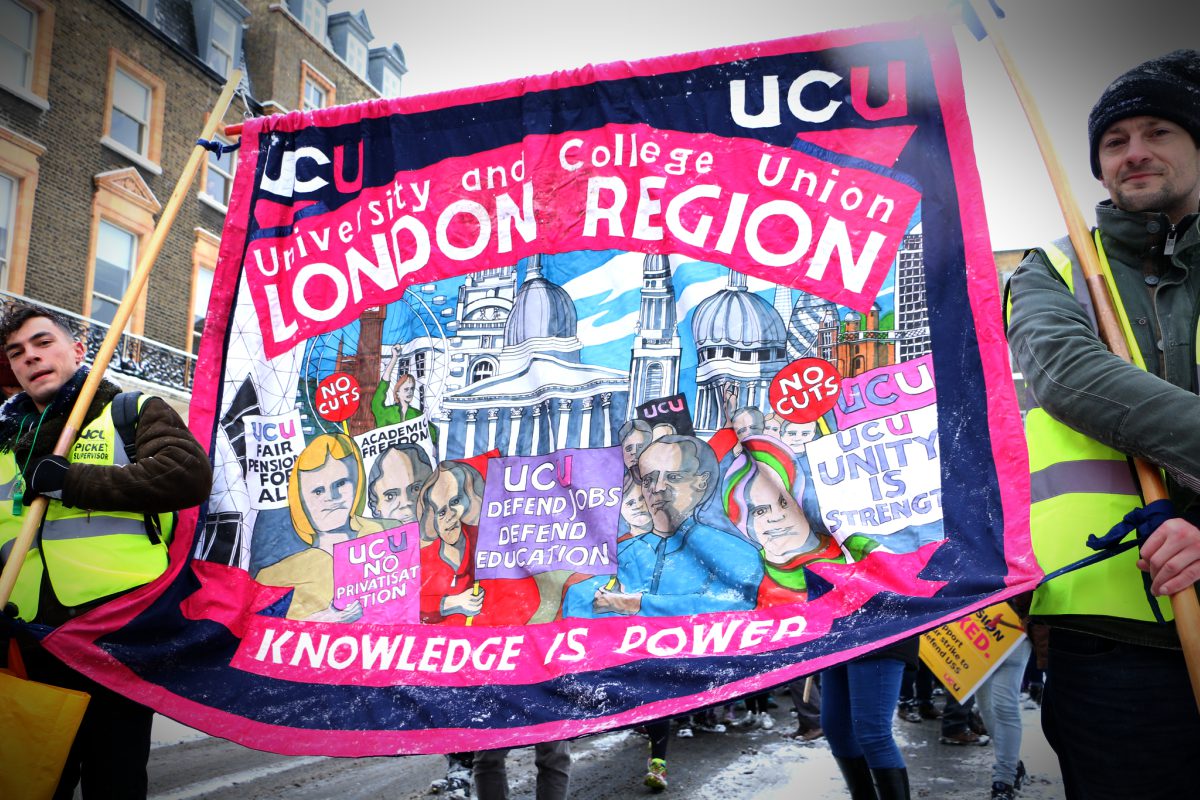An attack on jobs is on the horizon in higher education. The UCU has launched a campaign in response. But members must pressure the leadership to ensure a militant fightback is carried out.
The past few years have been transformative for the University and College Union (UCU). The conditions in the education sector include: a mental health and workload crisis; gender, disability and race pay gaps of up to 26%; ever increasing casualisation; a real-term pay cut of almost 20% over the last decade, and cuts to pensions which add up to a loss of £240,000 since 2011.
In response to all this, the Union has increased its membership and has undertaken the longest and largest strike action in its history.
However, despite 22 strike days this academic year so far, these issues are no closer to being resolved. The latest employers’ offer – which will do nothing to fundamentally address the problems at hand, and has given no concessions – looks set to be rejected.
The employers were prepared to sit this one out before the pandemic. They calmly waited until the last week of the strike action before making clear that they will not put any money on the table to achieve the urgent changes the sector needs. They were fully expecting that staff would come back to their workplaces and somehow catch up with the work that had been lost.
At the same time the pandemic and lockdown have sharpened the inequalities that mobilised members to strike in the first place. The pandemic has cut across any plans of returning to business as usual.
While members are caught between desperation and exhaustion, management have planned their next steps. In response, the UCU leadership belatedly announced a national campaign – “Fund the Future” – supposedly to advocate a “jobs first” response to the crisis.
Universities and colleges are projected to lose billions of pounds in income. We need these institutions – and the staff who make them what they are.
We need to #FundTheFuture
Visit https://t.co/An0ZbFCEJH
Watch our live launch event, 1-2pm ?https://t.co/myZfwF8BC7 pic.twitter.com/4HFg6c3Nfy— UCU (@ucu) June 12, 2020
However, the relief amongst UCU members following this announcement quickly turned to alarm, anguish, and anger. It became clear that Fund the Future was not the militant fightback that is needed and wanted. Instead, it looks like an insubstantial campaign that seeks to make the case for adequate funding for the sector by underscoring the importance of education. In light of this, many members are asking “how do we go forward from here?”
The pandemic
 Any discussion of strategy has to take into account how the coronavirus pandemic has reshaped the situation. It looks likely to have triggered a new global slump which will be the worst since 1929, and perhaps the worst in 300 years.
Any discussion of strategy has to take into account how the coronavirus pandemic has reshaped the situation. It looks likely to have triggered a new global slump which will be the worst since 1929, and perhaps the worst in 300 years.
Although it is impossible to tell exactly how this will pan out, it is clear that under the current Tory government the coming period will be one of further austerity and declining living standards. This will be the economic backdrop against which we continue our campaign.
Moreover, social distancing guidelines means that it looks unlikely that face-to-face teaching will resume in most universities until at least next year. The move to online teaching will necessitate a rise in workloads.
This will come on top of already unsustainable workloads in a sector in which 40% of work goes unpaid. Staff’s goodwill to take on extra training and shifts will not be rewarded after the crisis, regardless whether they are on fixed-term or permanent contracts. Such goodwill will be taken for granted and further exploited.
It is worth remembering the chaos that staff and students at universities had to deal with just before Easter. Institutions moved to working from home overnight, and expected some sort of online teaching and services within a week. Departments were frantic. Students and staff were buried in emails, and expected to check them every couple of hours for half-cooked plans involving drastic changes.
The inequalities experienced by casualised staff have become very apparent in this crisis. Many GTAs did not receive updates because they weren’t on the regular staff lists. Externally funded research staff were left to fight on their own for extensions – which is the equivalent of furloughing in the absence of a regular contract. Professional services and facility management got hardly any guidance as to when and how to work from home. Many simply could not afford to stay at home, even with pre-existing health conditions.
While management had no plans to keep staff and students safe, they immediately made plans to cut “excess” staff due to the expected lower student intake in the next academic year.
The uncertainty around student numbers in the next academic year led to sackings as soon as the pandemic started. Bristol, Newcastle and Sussex were amongst the first to dismiss staff on precarious contracts. Most universities have now announced a blanket recruitment freeze, and a halt to contract renewals and GTA placements. They have even argued that the government furlough scheme prohibits them to furlough teaching staff.
Voluntary redundancies have been announced at the University of Sheffield. More will follow elsewhere.
The hardest hit will be staff on fixed-term contracts, and hourly-paid and postgraduate staff in post-16 education. Across the whole sector, 68% of the 49,000 research staff, and 37,000 of teaching staff are on fixed-term contracts. This means that about 60,000 people are facing a very insecure future. Many will be unemployed by the end of June, when 10-month contracts conveniently run out before the summer break.
Next steps
A number of workers have already lost their jobs. In the weeks prior to the campaign announcement the union faced massive pressure from below to act.
An open letter called for immediate mobilisation and fightback. Grassroots initiatives such as the #CoronaContract campaign and @PandemicPGRs have mobilised members around emergency demands on a national level.
RT from locked account:
IF YOU DON’T DO IT, WE WILL
Urgent open letter to @ucu
General Secretary @DrJoGrady
and National Executive Committee calling for an immediate campaign to defend casualised workers in Higher Education. We cannot wait any longer. https://t.co/OSUXY4XFAk— Radical Education Forum (@edu_radical) June 2, 2020
The emergency demands put forward by these campaigns must be seen as a start to transform the sector. The membership must fight to ensure these demands are adopted as part of the “Fund the Future” strategy, in order to provide the campaign with some much needed substance. We need a commitment to immediately change fixed-term and casualised contracts into regular contracts with full working rights such as sick pay, holidays, and pensions.
This will cost money. But as the UCU has been arguing for the last year: the money exists, it is just not spent on staff. The union must argue for the right of elected representatives from each branch to go over the accounts of their institution. They can then identify where money is being misspent (for example on the massively inflated salaries of management), so that savings can be made to protect jobs as part of the “Fund the Future” campaign.
Of course, in the current emergency, individual institutions will find themselves in different financial situations. But it is then on us as trade union activists to link this up with the broader struggle against marketisation of education. We must work towards the nationalisation of the sector under democratic control of staff and students. The wealth exists in society to fully fund education, however it is currently in the wrong hands.
The two ongoing disputes cannot be sidelined by the pandemic any longer – both are exacerbated by COVID-19. However, this fight will only stand a chance of success if the membership is fully involved at every stage.
Branch committees need to prepare for the fact that the coming period will likely see management attempt to carry out cuts and layoffs of casualised staff, while attacking the conditions of permanent staff. Local branches need to begin meeting regularly online in order to prepare to fight back. Alongside this, last year’s efforts to democratise the UCU must be renewed. Union democracy cannot go to sleep – it must be intensified
As Jo Grady correctly pointed out at the campaign launch, campaigns need to be built from the ground up. However, this can only be done if there is a tangible campaign to actually organise around – this vital prerequisite is currently lacking.
Fight for the future
Members will be relieved that the UCU is not shutting up shop for the summer months. However, we need to be unequivocal in stressing that we face a fierce fight to protect jobs and improve conditions.
The ‘Fund the Future” campaign must give members the means to carry out this fight. This means militant mobilisation, no retreat on the disputes, a strategy of transforming the entire higher education sector, and a determination to win. Currently, the campaign fails to tick any of these boxes – it is up to the membership to pressure the leadership to carry out the fightback that is needed.
Moreover, solidarity campaigns with students and other unions on campus are more important than ever. We all stand to lose as a result of these attacks.
With the Tory government in charge during an unprecedented health and economic crisis, it is clear that it is not only the post-16 education sector who will be facing attacks. Our fight is the same fight as the fights being waged by unions such as the CWU, BFAWU and NEU. Solidarity and cooperation with other unions is therefore key to winning this struggle.
Model Motion
This branch notes that:
- The two existing disputes (the Four Fights, and USS pensions) remain unresolved. Alongside these, a massive attack on jobs is on the horizon. We are told this is due to a supposed “black hole” in university finances caused by the COVID-19 crisis.
- If management has their way, they will first cut the jobs of casualised workers and Graduate Teaching Assistants. Their workload will then be passed on to permanent staff who are already dangerously overworked.
- These attacks will occur in a broader context of austerity and declining living standards presided over by the current Conservative government. This is simply the latest in a succession of Conservative governments that have failed our sector.
Branch resolves:
- To support the #CoronaContract and @PandemicPGRs campaigns and to call on the UCU to incorporate the demands of these campaigns into its “Fund the Future” campaign.
- To call on the university to open their accounts and allow elected representatives from the UCU branch to go over the finances to identify how savings can be made without incurring job losses.
- To continue to fight for a successful outcome to the Four Fights and USS disputes in order to protect members against the effects of the coming downturn.
- To call on the UCU to link up with other unions on campus (such as Unison and Unite) and off campus (such as the NEU and CWU) whose members are also facing attacks on pay and conditions.






